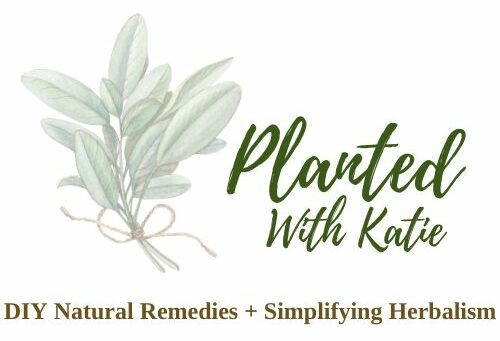Can Herbal Tea Go Bad? How To Store Loose Leaf Tea
Are you a tea lover? If so, you're familiar with the joy of enjoying a soothing cup of herbal tea. Whether it's the comforting taste of chamomile, the refreshing aroma of green tea, or the bold flavor of black tea, each sip offers a moment of relaxation.

This post may include affiliate links. Please refer to our disclaimer for full disclaimer.
But here's something to think about: Can herbal tea go bad? Let's take a closer look at tea storage and uncover the secrets to maintaining the freshness of your loose leaf tea.
No one wants to sit down with a cup of expired or old tea. Let's dive into the world of tea preservation and learn how to keep your favorite teas at their best.
Understanding Herbal Tea Shelf Life and Storage
Unlike perishable foods, tea doesn't exactly go "bad," but it does undergo changes over time that can impact its original flavor and potency. This transformation is especially noticeable with herbal teas, those delightful blends of dried flowers, leaves, and fruits.
If you want to learn more about the various shelf lives of each tea, check out this article.
These ingredients house delicate natural oils and compounds that are vulnerable to the passage of time, ultimately influencing the overall taste and aroma of your cherished brew.
The Shelf Life of Tea
Just like any other consumable product, herbal tea also has a shelf life. Although there isn't necessarily an expired tea debacle as tea doesn't necessarily go "bad" in the way that perishable foods do, it can lose its original flavor and potency over time.
This is especially true for herbal teas, which are often a blend of dried flowers, leaves, and fruits. The delicate natural oils and compounds in these ingredients can degrade with time, affecting the overall taste and aroma of the tea.
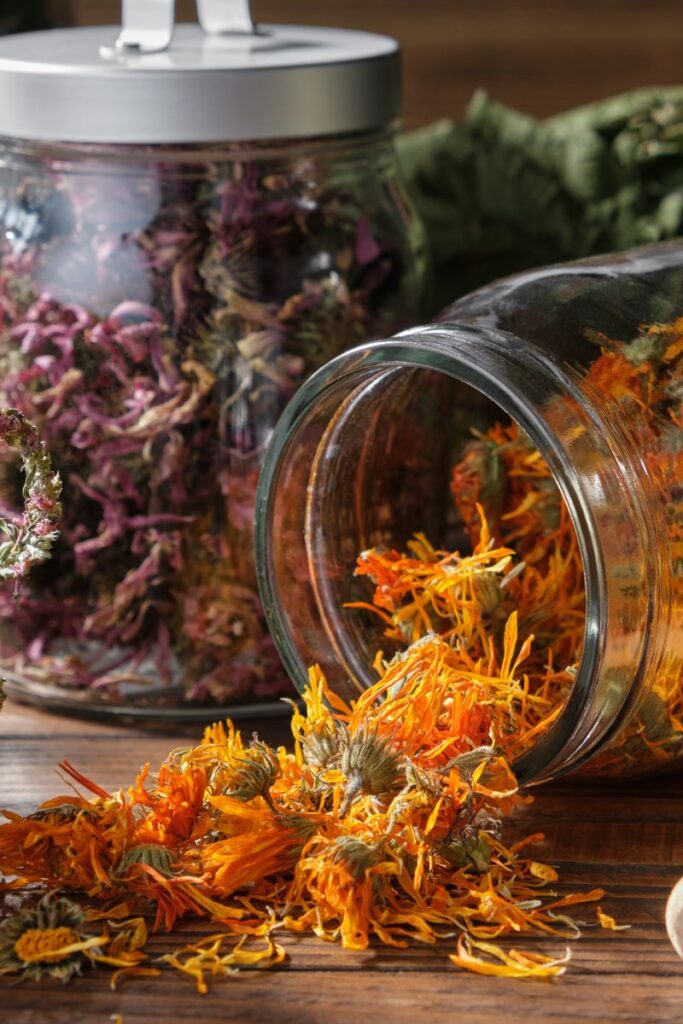
Factors Affecting Tea Freshness
The freshness of your herbal tea is influenced by several factors, including the type of tea, storage conditions, and packaging. To preserve the optimal flavor and quality of your loose leaf tea, it's important to consider these aspects.
My favorite online tea stores for maximum freshness and health benefits, are Starwest Botanicals and Mountain Rose Herbs.

How To Properly Store Loose Leaf Tea
Elevating your herbal tea experience starts with choosing the right vessel for its safekeeping. While the initial packaging of tea bags and loose leaf tea may appear practical, they often fall short when it comes to airtight preservation.
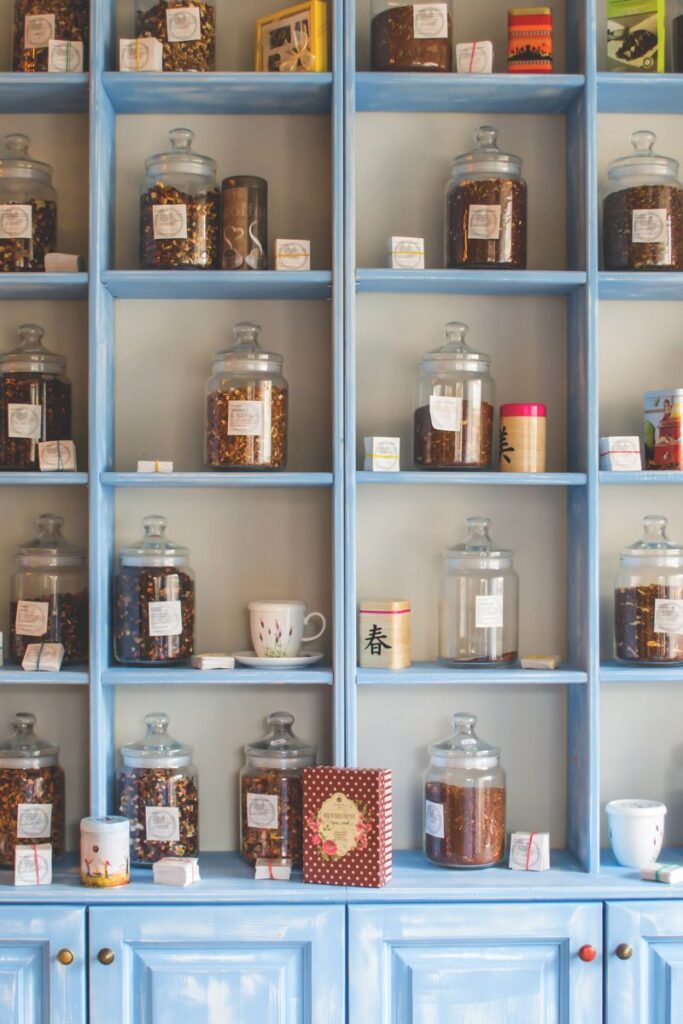
The best way to store teas is in airtight containers. Transferring your cherished tea into an airtight container is akin to giving it a shield against the elements that threaten its essence.
Glass Jars with Sealed Lids
Opting for glass jars with tightly sealed lids is a classic choice for tea enthusiasts. The transparent nature of glass allows you to appreciate the beauty of your tea leaves while providing an airtight environment that protects against moisture, air, and unwanted odors.
Stainless Steel Tins with Locking Mechanisms
Stainless steel tins equipped with locking mechanisms offer a secure sanctuary for your herbal teas. Their sturdy construction ensures that the delicate tea leaves remain sheltered from external factors that might compromise their delicate flavors.
Vacuum-Sealed Canisters
If you're seeking an extra level of protection, vacuum-sealed canisters are an excellent option. These containers use advanced technology to remove excess air, creating an environment that is nearly devoid of oxygen – a key factor in preserving tea freshness.
Resealable Foil Bags
For loose leaf teas that come in resealable foil bags, ensuring a proper seal after each use can extend the life of your tea. Pressing out excess air before sealing the bag will help prevent premature degradation of the tea's flavor and aroma.
Opaque or Amber Containers
Opt for opaque or amber containers if your tea storage area is exposed to light. Light can degrade the tea leaves and diminish their quality over time. Opaque containers keep your tea shielded from light, contributing to its overall longevity.
My favorite site for affordable containers, is Your Oil Tools. If you're into making your own herbal remedies or essential oils, this is a trusted source for packaging so each remedy stays potent longer.
Choosing the Ideal Location
Light, humidity, and temperature are your tea's foes. Store your loose leaf tea in a cool, dark, dry place, away from direct sunlight and heat sources.
A pantry or cupboard is an excellent choice. Avoid storing your tea in areas with high humidity, such as near the stove or dishwasher, as moisture can accelerate the degradation process.
Original Packaging or Not
Loose-leaf tea usually comes in an airtight containers, if the sourcing and brand knows what they're doing. When teas come in cardboard boxes, wrapped in tea bags, they've usually already lost a lot of freshness.
When I gift someone a loose-leaf tea blend, they always remark about how strong and flavorful it is! Loose-leaf tea is a lot fresher, and stronger than bagged tea from the supermarket.
The packaging your tea comes in matters. If your tea is already stored in a sealed, opaque, and airtight container, you can keep it in its original packaging. However, if your tea arrives in a simple paper bag or plastic wrap, consider transferring it to a proper storage container.

Understanding Tea Expiration Dates
Best-By Date
Many commercial teas come with a "best-by" date on the packaging. This date indicates the manufacturer's estimate of when the tea is at its peak flavor and quality.
However, it's important to note that tea doesn't necessarily expire after this date. Instead, the best-by date serves as a guideline for experiencing the tea's full potential.
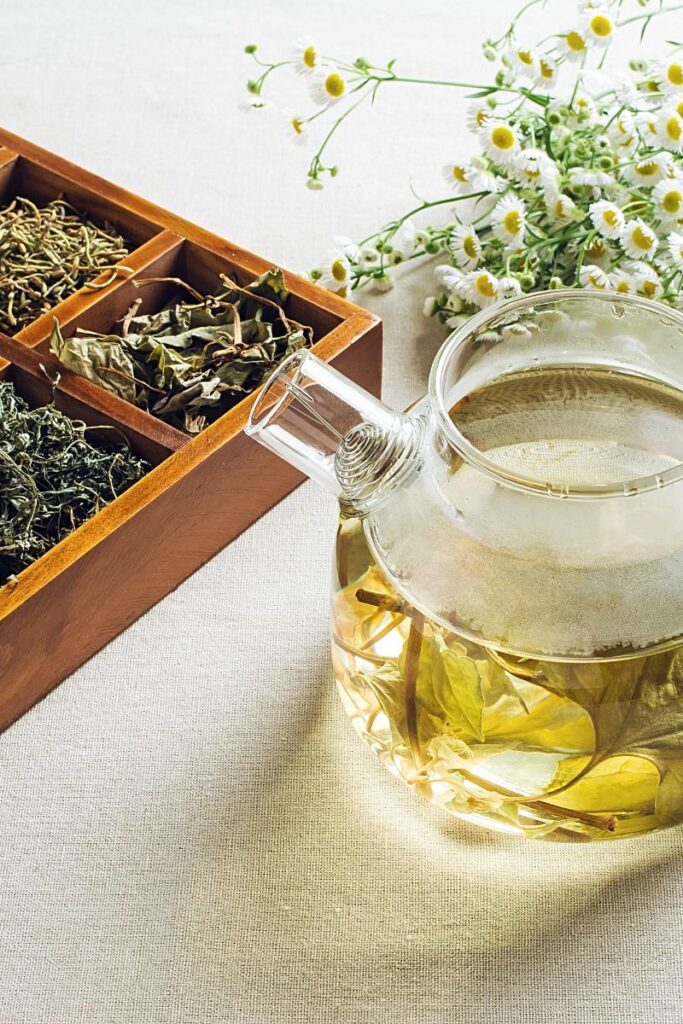
Using Your Senses
The simplest way to check if your herbal tea is still good is to use your senses. Take a look at the tea leaves – do they still look vibrant and aromatic? Give them a sniff – does the aroma make you anticipate a good cup of tea? If the answer is yes, your tea is likely still good to use.
If the aroma or vibrancy is lacking, you can still make your cup of tea, I would just add more of the herb since it could be less flavorful as is.
Too often, I've picked up a box of chamomile tea and couldn't even place the smell of it. Freshly grown chamomile tea has a distinct, very pleasant, yet lightly floral scent. Chamomile tea from the market doesn't even come close to this smell.
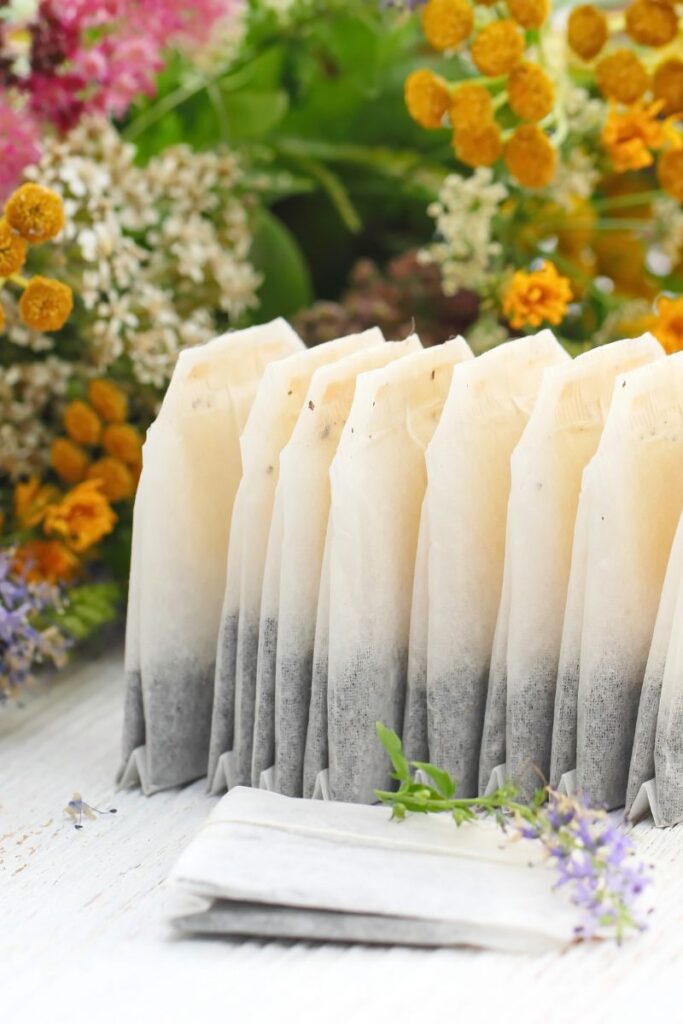
The Impact of Proper Tea Storage
Keeping the Flavor of Your Tea
Properly storing tea in a sealed container isn't just about avoiding spoilage; it's about holding onto its great taste.
Whether you're enjoying the gentle touch of white or oolong tea or the rich notes of black or pu-erh tea, storing it right helps the flavors stay fresh and vibrant, making each cup a delightful experience.
Health Benefits
Herbal teas aren't just tasty; they can be good for you too. I mainly speeak about the health benefits of various teas. Various teas can help you recover from colds and flus, calm an upset stomach, soothe a fever, and so much more.
Storing loose leaf tea the right way preserves its natural compounds and antioxidants, which can have health benefits. The longer your tea stays fresh, the more you can enjoy its potential to boost your well-being.
Preserving the Aroma
The wonderful smell of tea is part of its charm. Proper storage doesn't just keep the tea fresh; it also keeps its captivating scent alive. Like a lovely perfume, well-stored tea releases its inviting aroma, making each cup not just a drink, but an aromatic experience.
Keeping your tea in a cool dark place will help preserve the freshness and aromas of each herb.
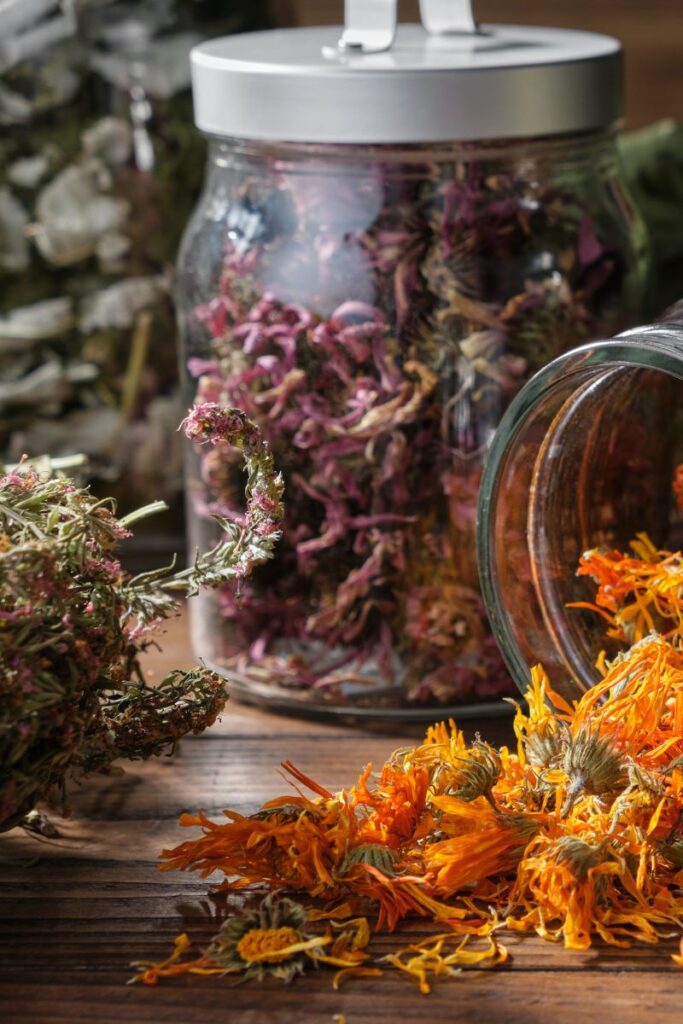
Cooking Potential
Tea isn't only for drinking; it can also enhance your cooking. Whether you're adding tea to sauces or using it as a spice, the quality of your dishes depends on the tea's freshness. Storing it right protects the tea leaves, ensuring your culinary experiments are filled with natural flavors.
For example, my homemade vegetable bouillon recipe is rich with maximum flavor and brings new tastes to any soup or broth you use it for. But, if you're using older herbs, you won't get the same affect.
In short, proper tea storage is more than just preventing it from getting stale. It's a way to preserve great taste, lovely aroma, potential health benefits, and culinary adventures that each tea leaf carries. By learning how to store tea correctly, you're not just taking care of a drink – you're nurturing a world of enjoyable flavors and well-being.
Can Herbal Tea Go Bad?
So, can herbal tea go bad? While herbal tea doesn't exactly "go bad" like perishable foods, it can lose its original flavor and potency over time.
By understanding the factors affecting tea freshness, choosing the right storage container, and paying attention to best-by dates, you can ensure that your tea remains a delightful and flavorful companion in your daily routine.
Whether you're savoring a cup of green tea to kickstart your morning or enjoying a calming chamomile infusion before bed, proper tea storage enhances the experience and allows you to get the maximum flavors and make the most of your tea leaves' natural goodness.
